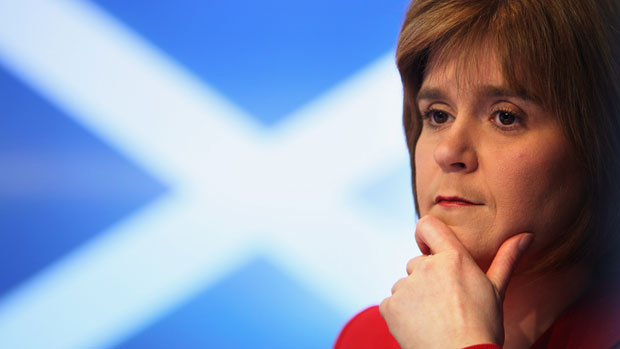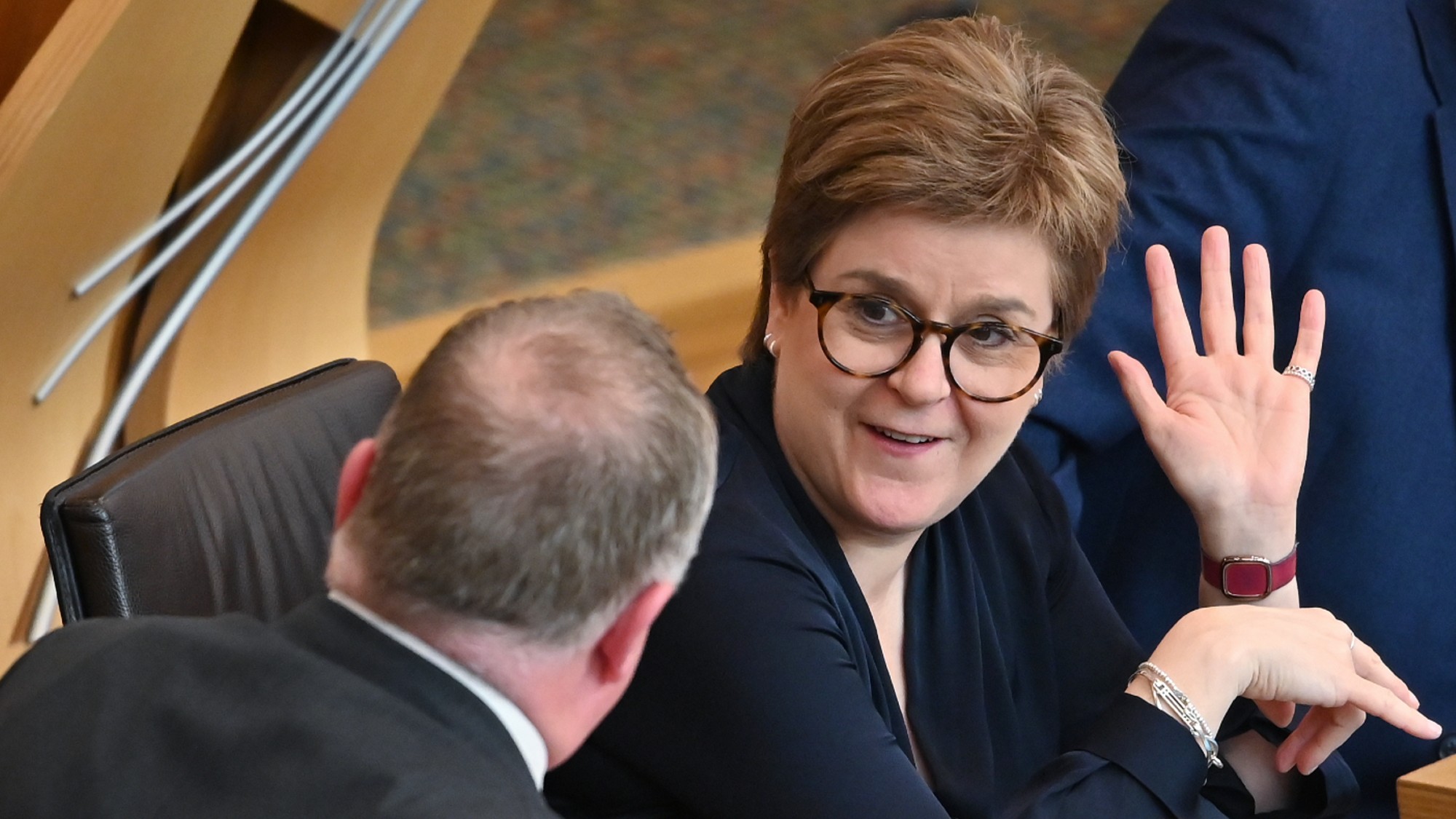Nicola Sturgeon: the First Minister 'holding all the aces'
From youngest parliamentary candidate in Scotland to one of the most powerful women in the UK

A free daily email with the biggest news stories of the day – and the best features from TheWeek.com
You are now subscribed
Your newsletter sign-up was successful
Name:
Nicola Ferguson Sturgeon
School:
The Week
Escape your echo chamber. Get the facts behind the news, plus analysis from multiple perspectives.

Sign up for The Week's Free Newsletters
From our morning news briefing to a weekly Good News Newsletter, get the best of The Week delivered directly to your inbox.
From our morning news briefing to a weekly Good News Newsletter, get the best of The Week delivered directly to your inbox.
Dreghorn Primary School and Greenwood Academy
University:
University of Glasgow (LLB and diploma)
Fondness for:
A free daily email with the biggest news stories of the day – and the best features from TheWeek.com
Indian takeaways, Borgen, the colour red, theatre and historical fiction
What is Sturgeon's background?
Sturgeon joined the SNP at the age of 16 and first stood for election in 1992 in the Glasgow Shettleston constituency. At 21, she was the youngest parliamentary candidate in Scotland, but unsurprisingly failed to win the staunch Labour seat. After qualifying with a law degree, Sturgeon worked as a solicitor at Drumchapel Law Centre. She was later elected as an MSP representing the city of Glasgow in 1999 and was re-elected in 2003. In 2007, she won the Glasgow Govan constituency from Labour and is now MSP for Glasgow Southside.
What about her family life?
Sturgeon was born in the North Ayrshire town of Irvine in 1970 to dental-nurse Joan and electrician Robert. She says she grew up in a "fairly standard, normal, working-class family" with a "fairly unremarkable" childhood. The First Minister is married to Peter Murrell, SNP's chief executive, who she first met at an SNP youth weekend in Aberdeenshire in 1988. They married in 2010.
How did she become SNP leader?
After winning the Glasgow Govan seat in 2007, Sturgeon was made Deputy First Minister and Health Secretary, winning popularity for scrapping prescription and hospital car park charges. She was later given the responsibility of overseeing the Scottish independence referendum last year. When Alex Salmond stood down after the referendum, Sturgeon was elected unopposed as SNP leader on 19 November 2014.
What does Sturgeon stand for?
After succeeding Salmond, Sturgeon announced that a second Scottish independence referendum was at the top of her political agenda, and one of her first acts as First Minister was to create a gender-balanced cabinet. She has named Nelson Mandela and Scottish nationalist Winnie Ewing among her heroes and told the Financial Times that she gets "very angry at the degree of inequality we have in a very rich country".
How popular is Sturgeon?
In October last year, Sturgeon topped a Scottish politician trust rating poll, with 54 per cent of people believing she would stand up for the country's interests. Her popularity has risen south of the border following the ITV leaders' debate on 2 April. The First Minister, who is not even standing at the general election in May, was named the winner of the debate by a YouGov poll with 28 per cent of people saying she gave the best performance. Other surveys put her in the top four. With polls in Scotland pointing to a significant increase in SNP seats in May, Sturgeon "is the woman who now holds all the aces", says the Scottish Daily Mail's Chris Deerin.
What's her worst gaffe?
As Deputy First Minister, Sturgeon issued an apology in 2010 for lobbying a court to give a constituent a non-custodial sentence after he admitted an £80,000 benefits fraud. "I assisted a constituent in good faith and for what I considered to be the right reasons, but in doing so I did get some things wrong and for that I am sorry," she said. The incident initially prompted demands for her resignation, but after the apology the opposition accepted that she had shown "humility".
-
 How the FCC’s ‘equal time’ rule works
How the FCC’s ‘equal time’ rule worksIn the Spotlight The law is at the heart of the Colbert-CBS conflict
-
 What is the endgame in the DHS shutdown?
What is the endgame in the DHS shutdown?Today’s Big Question Democrats want to rein in ICE’s immigration crackdown
-
 ‘Poor time management isn’t just an inconvenience’
‘Poor time management isn’t just an inconvenience’Instant Opinion Opinion, comment and editorials of the day
-
 How corrupt is the UK?
How corrupt is the UK?The Explainer Decline in standards ‘risks becoming a defining feature of our political culture’ as Britain falls to lowest ever score on global index
-
 The high street: Britain’s next political battleground?
The high street: Britain’s next political battleground?In the Spotlight Mass closure of shops and influx of organised crime are fuelling voter anger, and offer an opening for Reform UK
-
 Is a Reform-Tory pact becoming more likely?
Is a Reform-Tory pact becoming more likely?Today’s Big Question Nigel Farage’s party is ahead in the polls but still falls well short of a Commons majority, while Conservatives are still losing MPs to Reform
-
 Taking the low road: why the SNP is still standing strong
Taking the low road: why the SNP is still standing strongTalking Point Party is on track for a fifth consecutive victory in May’s Holyrood election, despite controversies and plummeting support
-
 Nicola Sturgeon's memoir: making the personal political
Nicola Sturgeon's memoir: making the personal politicalTalking Point Former Scottish first minister attempts to set record straight in 'Frankly' but does she leave more questions than answers?
-
 What difference will the 'historic' UK-Germany treaty make?
What difference will the 'historic' UK-Germany treaty make?Today's Big Question Europe's two biggest economies sign first treaty since WWII, underscoring 'triangle alliance' with France amid growing Russian threat and US distance
-
 Is the G7 still relevant?
Is the G7 still relevant?Talking Point Donald Trump's early departure cast a shadow over this week's meeting of the world's major democracies
-
 Angela Rayner: Labour's next leader?
Angela Rayner: Labour's next leader?Today's Big Question A leaked memo has sparked speculation that the deputy PM is positioning herself as the left-of-centre alternative to Keir Starmer